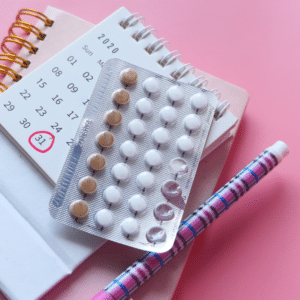
The hormones in the pill, progestin (which mimics progesterone) and estrogen, decrease the release of GnRH, and therefore the release of FSH and LH. This restricts the follicles from growing, and by extension, an egg from growing and releasing from the ovary.
All women are different, which is why the pill works to varying degrees of effectiveness. Some also experience side effects.
Birth Control Pill Side Effects
The most common side effect is spotting. This is due to the changes in hormone levels. Most women's bodies adjust after a few months of being on the pill. Other side effects include nausea, headaches, depression, moodiness, acne, and weight gain. The pill can have more serious side effects, although rare. These risks include high blood pressure, blood clots, stroke, and heart attack.
Your Dr. can help you decide what birth control option is best for you. Contact us today to make an appointment.
